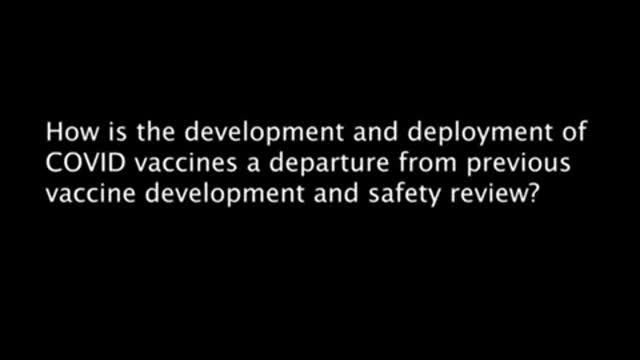Premium Only Content

MD predicts forced COVID-19 vaccinations
Academic History
Dr. McCullough attended Baylor University and graduated with a Bachelor of Science degree in 1984. He then attended the University of Texas Southwestern Medical Center, where he studied for his medical degree and graduated in June 1988. Following this, he undertook his residency in internal medicine at the University of Washington School of Medicine in Seattle, where he trained for 3 years.¹
Upon completing his residency in 1991, Dr. McCullough transferred to Grayling, Michigan, where he served for 2 years as an internal medicine attending at Mercy Hospital. Following his time at Mercy Hospital, he enrolled at the University of Michigan School of Public Health and studied a Masters degree in Public Health.
After he graduated from the University of Michigan School of Public Health in 1994, he became a fellow in cardiovascular diseases at the Beaumont Hospital in Royal Oak, Michigan.
Career Overview
Dr. McCullough joined the Henry Ford Heart and Vascular Institute in Detroit following his fellowship at the Beaumont Hospital, where he remained until 2000. He then moved to Kansas City, Missouri, to serve as Section Chief of Cardiology of the University of Missouri-Kansas City School of Medicine, Truman Medical Centers.
After his time in Missouri, Dr. McCullough returned to Michigan to serve as a Consultant Cardiologist at the Beaumont Hospital, and also as Chief, Division of Nutrition and Preventive Medicine Division of Cardiology. In 2010, following his stint at Beaumont Hospital, he was appointed as the Chief Academic and Scientific officer of the St. John Providence Health System, also in Detroit. In 2014, Dr. McCullough joined Baylor University Medical Center as Vice Chief of Internal Medicine. He was also appointed Chief of Cardiovascular Research of the Baylor Heart and Vascular Institute, and Program Director of the Cardiovascular Disease Fellowship Program.²
Dr. McCullough is recognized internationally as a leading figure in the study of chronic kidney disease as a cardiovascular risk state, having over 1,000 publications to his name and over 500 citations in the National Library of Medicine.³ He is also a founder of the Cardio Renal Society of America, which is a group that dedicates itself to bringing cardiologists and nephrologists together to work on the increasing global issue of cardiorenal syndromes. He is the Co-Editor of Reviews in Cardiovascular Medicine and is also currently serving as the Chair of the National Kidney Foundation's Kidney Early Evaluation Program (KEEP), the largest community screening effort for chronic diseases in America.⁴
-
 LIVE
LIVE
vivafrei
1 hour agoGuest "Misfit Patriot" on Andrew Tate & Casey Anthony! Canada Goes Full Trade War! ACB = DEI?
1,822 watching -
 LIVE
LIVE
The Charlie Kirk Show
56 minutes agoCharlie vs. Gavin Newsom | Jonathan "Lomez" Keeperman | 3.6.25
8,058 watching -
 LIVE
LIVE
Simply Bitcoin
1 hour agoCould The NEXT 24 Hours Change The 2025 Bitcoin Bull Market? | EP 1197
155 watching -
 49:57
49:57
The Dan Bongino Show
3 hours agoAnother Phony Narrative Crumbles + First Show In The New Studio! (Ep. 2437) - 03/06/2025
498K1.01K -
 44:26
44:26
The Rubin Report
2 hours ago'Real Time' Crowd Stunned by Bill Maher’s Unexpected Glaring Blind Spot
22.9K23 -
 DVR
DVR
Benny Johnson
2 hours agoDeep State PURGE: CIA Agents STRIPPED of Badges as Trump DISMANTLES Dept of Education | Dem CENSURED
43.3K49 -
 LIVE
LIVE
Grant Stinchfield
1 hour agoWhat Happened to the Mystery Drones? They Don't Just Disappear, or do They?
1,518 watching -
 LIVE
LIVE
Flyover Conservatives
12 hours agoThe Medical Industry’s Dark Secret—What They Don’t Want Pregnant Women to Know! - Dr. James Thorp | FOC Show
659 watching -
 1:01:32
1:01:32
Standpoint with Gabe Groisman
2 days agoThe War on Israel: Yair Netanyahu Tells All
16.6K2 -
 2:10:19
2:10:19
Steven Crowder
4 hours agoTrump Loves Dictators: Debunking the Left’s Latest Attack Strategy
306K196